Justice Nial Fennelly delivers Walsh Lecture
News
- The James C Brady Prize Award winning students for 2022/2023
- Matheson Diversity in Law Newman Fellow appointed at UCD Sutherland School of Law
- Guide for 2024 Referendums on Family and Care
- Professor Aisling Swaine joins UCD Sutherland School of Law from UCD School of Social Policy, Social Work and Social Justice
- Aedamar Comiskey is honoured as Law Alumni Award Winner 2023
- The Bank of Ireland Finance Student Awards November 2023
- Milestone Reunion of the Classes of 1983, 1993, 2003 and 2013
- The new Individual Accountability Framework in Financial Services Ireland
- Leading scholar of EU Law and Labour Law appointed Full Professor at UCD Sutherland School of Law
- Court of Appeal Workshop
- Four Adjunct Professors Appointed to UCD Sutherland School of Law
- Launch of Barristers in Ireland: An Evolving Profession Since 1921 by Dr Niamh Howlin
- UCD SUTHERLAND OPPORTUNITY supported by MASON HAYES & CURRAN LLP BURSARIES
- Professor Ian O'Donnell wins US Criminology Book Award
- Four UCD Law students take part in Our Rule of Law Academy in Brussels
- International Conference on Education and Democratic Citizenship (ICEDC) hosted in Sutherland School of Law
- International Symposium “Entrenching a Global Health Emergency Mode: Implications for Health and Human Rights Law”
- John M. Kelly lecture 2023 delivered by Baroness Onora O’Neill
- The 1981 BCL Class celebrate forty years since graduation
- Minister Roderic O’Connor chairs panel at seminar hosted by UCD Centre for Constitutional Studies
- Leading scholar of international refugee and migration law appointed Full Professor at UCD Sutherland School of Law
- Caoilfhionn Gallagher KC appointed Adjunct Full Professor at UCD Sutherland School of Law
- Copy of Donnybrook Magdalene Laundry Book Presented to the President of Ireland
- UCD team wins the 2023 Corn Adomnáin – International Humanitarian Law Competition
- UCD Sutherland Opportunity supported by Mason Hayes & Curran BURSARIES
- HRER/ UCD Conference 12 June 2023: preliminary announcement and Call for Papers (deadline 13.03.23)
- Professor Gráinne de Búrca awarded UCD Honorary Degree of Doctor of Laws
- Further Learning in Employment Law
- UCD Law Team wins the National Moot Court Competition 2022
- Dr Michael F Farrell, human rights activist awarded Honorary Degree of Doctor of Laws
- UCD Law alumna, Judge Síofra O’Leary, appointed president of European Court of Human Rights
- Large numbers of Alumni attend the 2022 Milestone Reunion
- Portrait of Mrs Justice Catherine McGuinness
- Dr Lukasz Grzejdziak appointed to EU Project for sustainable reforms in Ukraine's justice sector
- Mr Justice Gerard Hogan launches ‘Palles: The Legal Legacy of the Last Lord Chief Baron
- Conferring of UCD Matheson PhD Scholar in Commercial Law
- UCD PhD Student Awarded Irish Research Council Funding
- Professor Laurent Pech appointed Dean at UCD Sutherland School of Law
- Magdalene Laundries: Told, Acknowledged and Not Forgotten
- Professor John D Feerick conferred with honorary Degree of Doctor of Law
- 2022 Matheson | UCD Leadership Series Crypto and the Digital Assets Revolution: What’s Next?
- Histories of Probation in Ireland: A Theoretical Analysis
- Three Upcoming Constitutional Law Conferences in UCD Sutherland School of Law
- Lord Hendy focuses on P&O Ferries for the 2022 Guest Lecture in Employment Law
- Lord Sumption delivers the 2022 John M. Kelly lecture to a large audience in UCD Sutherland School of Law
- Chief Justice Launches UCD Student Legal Services Journal 2022
- The Rt. Hon the Lord Mayor of the City of London, Alderman Vincent Keaveny visits UCD Sutherland School of Law
- UCD Law hosts Student Event on The European Strategic Autonomy with Admiral Mellett (ret.) and Colonel Dirou
- UCD Law Students Refugee Law Mooting Success
- Major Conference on Philanthropy hosted by UCD Sutherland School of Law
- Fourteen Law Students Awarded Medals at Bank of Ireland Prize Giving
- Professor Imelda Maher appointed Fellow at New York University
- 2022 Helga Pedersen Moot Court Competition
- Ad Astra Fellows, UCD Sutherland School of Law
- Sutherland Fellow in French Law 2021/22
- Legal History Research Group publishes new book
- Mentors Sought for UCD Law Students
- Alumnus Vincent Keaveny appointed Lord Mayor of the City of London
- Three Doctoral candidates awarded Irish Research Council Scholarships
- European Traineeship in Intellectual Property
- THE Rankings position UCD Sutherland School of Law as Ireland’s leading University Law School
- The Class of 2022
- News 2021
- News 2020
- News 2019
- News 2018
- News 2017
- News 2016
- Marie Luce Paris Wins Award
- Distinguished Guest Lecture in Employment Law
- 40th Annual Bank of Ireland Student Awards
- Graduates Celebrate Milestone Reunion
- Book Launch on Mass Party Action draws a crowd
- Prof Devenney meets Ambassador Hennessy
- Prof Maher appointed President of the SLS
- UCD Law Review Launch
- Law and Film
- McCann FitzGerald Chair of International Law and Business
- Financial Action Task Force (FATF)
- Employment Law Conference in UCD Sutherland School of Law
- Visit of University of Paris II to UCD
- UCD BCL Student Addresses UN Committee
- Competition Law Scholars Forum (CLaSF) Workshop
- Justice Nial Fennelly delivers Walsh Lecture
- UCD BCL/Maîtrise Student receives prestigious award in France
- EU Field Trip
- UCD Law Student Wins Irish Asylum Law Award
- Review of new book by Emeritus Prof Nial Osborough
- Constitutional Review book by Dr Marie-Luce Paris and Prof John Bell
- McCann Fitzgerald Law into Art Competition Winners Announced
- The John M Kelly Memorial Lecture 2016
- UCD Law Students win International Debating Competition
- Sutherland School of Law join Indian community celebrating Dr Ambedkar
- Harry Cayton CBE delivers first McDowell Purcell Lecture
- Class Photographs Final Year 2016
- Arthur Cox Contribution to University Life Award Winners Announced
- The Irish Embassy in Brussels hosts UCD Alumni Reception
- VV Giri honoured at reception in Sutherland School of Law
- Celebrations for Tenth Anniversary of Dual Degree in French Embassy
- Sutherland School of Law students awarded for their achievements
- Fourth London Law reception
- Dr Mary Catherine Lucey invited to speak in Singapore
- Walsh Lecture delivered by Hon. Ms. Justice Mary Finlay Geoghegan
- Diploma in Professional Regulation
- Launch of McCann Fitzgerald Law into Art Award
- Employment Law Guest Lecture and Book Launch
- The 39th Bank of Ireland Awards
- Michael McDowell launches book by Dr Joe McGrath
- Over 180 attend reunion at Sutherland School of Law
- Launch of ‘International Human Rights: Perspectives from Ireland’
- Claire Mohan wins prestigious award from French University
- 9th Annual Postgraduate Workshop
- SRA Requirements for UCD School of Law graduates between 2004-2014
Justice Nial Fennelly delivers Walsh Lecture on the judicial legacy of the late Justice Adrian Hardiman
THE UCD Sutherland School of Law was again honoured to host the annual Walsh lecture in honour of the late Justice Brian Walsh. In a distinguished career in both the European Court of Human Rights and the Irish Supreme Court, Justice Walsh made a lasting impact on Irish society and has been described as “the outstanding legal reforming mind of his generation” by noted historian John J Lee.
The Hon. Mr Justice Nial Fennelly delivered this year’s lecture on the subject of “The Judicial Legacy of the Hon. Mr Justice Adrian Hardiman. Mr Justice Fennelly sought to distill the basic principles that underlay the many detailed and finely-honed judgments that his late colleague on the Supreme Court Mr Justice Hardiman had delivered in his sixteen years as a judge.
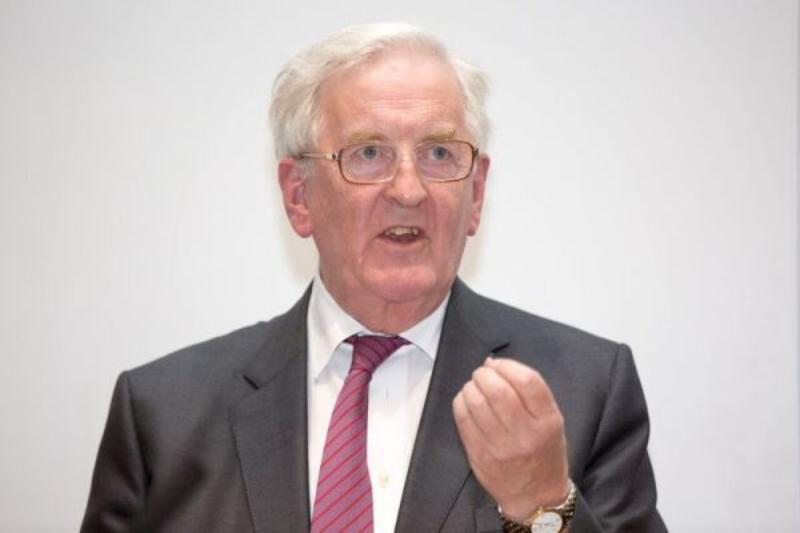
Mr Justice Fennelly speaking in the A&L Theatre in the UCD Sutherland School of Law
(opens in a new window)Walsh Lecture 16 from (opens in a new window)UCD Sutherland Law on (opens in a new window)Vimeo.
The lecture fell broadly into two parts: on one hand, Adrian Hardiman's contribution to the constitutional dimension of the criminal law and on the other, his view of the limits of the judicial role, in the context of the separation of powers that ought to exist in Ireland.
In relation to the first group of cases, Mr Justice Fennelly identified three fundamental topics - the preservation of evidence cases, the cases of delay in prosecuting for alleged sexual offences and the development of the law in relation to the exclusion of unconstitutionally obtained evidence. The first topic concerns cases where the Gardaí have lost or failed to secure evidence on which the accused might have relied in his or her defence. Here, Mr Justice Hardiman played a key role in the development of the case law. In doing so displayed his tremendous attention to detail and the strength of his commitment to a fair trial according to what he took to be basic norms of the modern common law in relation to delay in cases of alleged sexual offences, Mr Justice Hardiman's passionate commitment to the adversarial nature of the criminal trial and the key role of cross-examination was again in evidence. In relation to the last topic related to the criminal law, the exclusion of unconstitutionally obtained evidence, Mr Justice Fennelly dwelt on Mr Justice Hardiman's remarkable dissent in DPP v JC, in which all his best qualities were spectacularly displayed. The invocation of the 'force publique' - in all its forms - and the need to have firm barriers against its arbitrary exercise was at the heart of Hardiman's objections to his colleagues relaxation of the exclusionary rule as it was of so many other judgments he delivered.
Turning away from the criminal law, Mr Justice Fennelly surveyed some other aspects of the Hardiman conception of the judicial role. He observed first that this belied any casual assumption that a judge who found in favour of criminal defendants in many cases where his colleagues did not must also generally look with favour on plaintiffs in tort cases. That Mr Justice Hardiman did not - as in the relatively restrictive view he took of vicarious liability in O'Keeffe v Hickey - reflected his sense that imposing criminal and civil liability were weighty matters and his belief that the judiciary did not have the power to recast the law to satisfy vague notions of justice that did not correspond to the well-established norms of the common law. Another area where his commitment to the separation of powers was evident was in Maguire v Ardagh, where he also brought his considerable abilities as an historian to bear in disposing of the claim that the Houses of the Oireachtas inherited from the Westminster Parliament a broad power to conduct inquiries into matters of public interest.
As much as describing the legal rules and principles addressed in Mr Justice Hardiman's judgements, Mr Justice Fennelly sought to convey his personal qualities as a judge - his passion for justice, his profound sense of the importance of history, his peerless attention to detail, his fearlessness in standing his ground for what he believed to be right and the eloquence with which he could express his views, whether among the majority or in dissent.
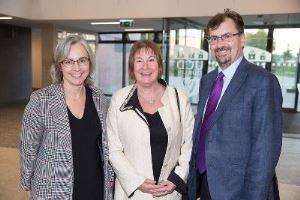 |
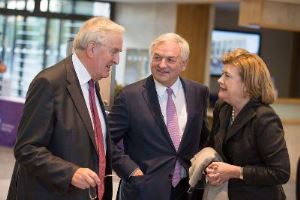 |
| (L-R)Prof Imelda Maher, Judge Yvonne Murphy (wife of the late Adrian Hardiman), Prof Colin Scott | (L-R) Justice Nial Fennelly with Declan and Margaret McCourt (daughter of the late Justice Brian Walsh) |
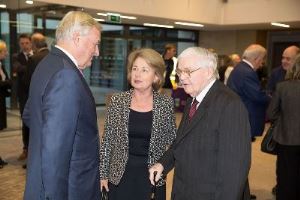 |
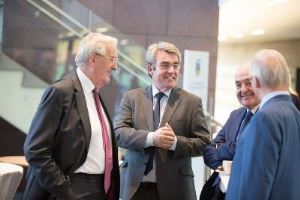 |
| (L-R) Declan McCourt with Justice Mary Finlay Geoghegan and her father, former Chief Justice Tom Finlay | (L-R) Justice Nial Fennelly with Prof Joe McMahon, UCD Judge in Residence, Aindrias Ó Caoimh and Ian Cornelius |
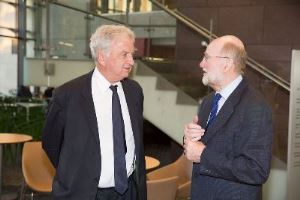 |
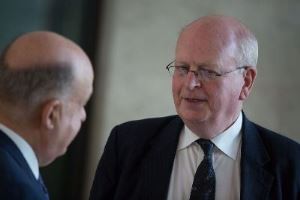 |
| (L-R) Frank Callanan SC with Former AG Harry Whelehan SC | (L-R) Aindrias Ó Caoimh with Senator Michael McDowell SC |
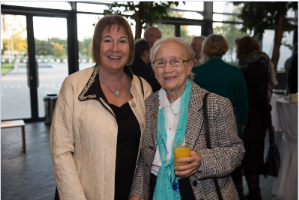 |
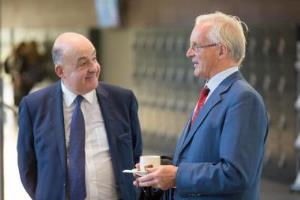 |
| (L-R) Judge Yvonne Murphy with Justice Catherine McGuinness | (L-R) UCD Judge in Residence, Aindrias Ó Caoimh with Ian Cornelius |
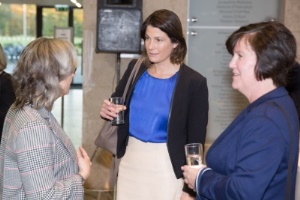 |
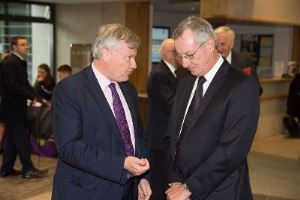 |
| (L-R) Prof Imelda Maher, Orla Tighe and Dr Mary Catherine Lucey | (L-R) John Costello with Justice Sean Ryan (President of the Court of Appeal) |